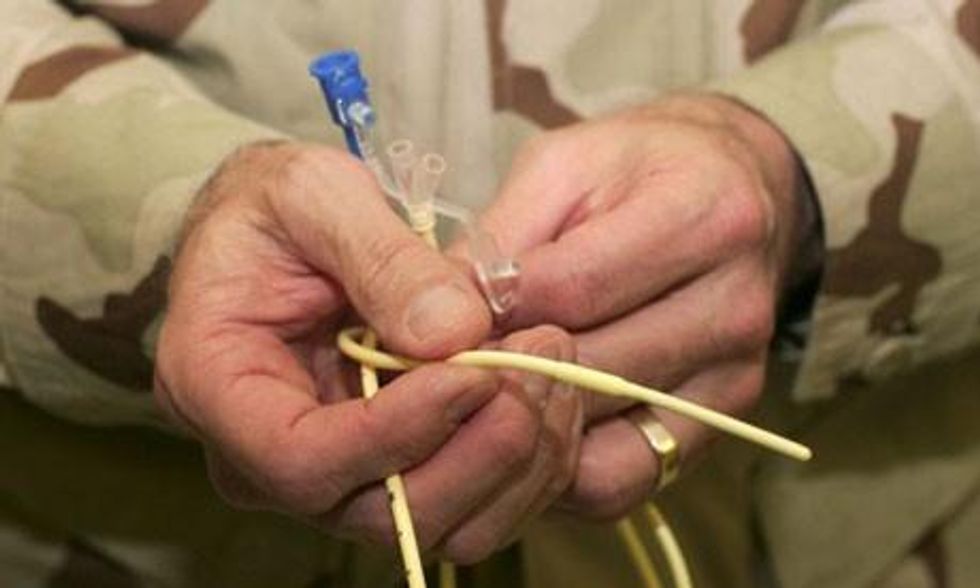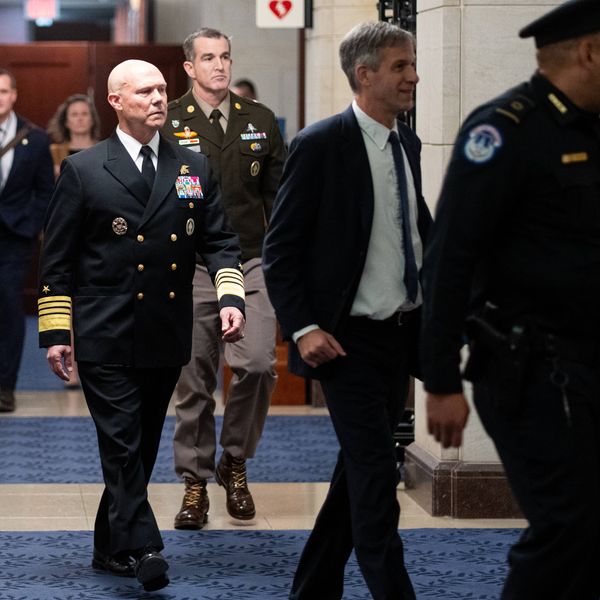Report: US Military Doctors Complicit in Torture
Experts say health professionals used to design and participate in cruel, inhumane, and degrading torture of military detainees

The report, Ethics Abandoned: Medical Professionalism and Detainee Abuse in the War on Terror, was conducted by the 19-member Task Force on Preserving Medical Professionalism in National Security Detention Centers over a two-year period. The report describes how doctors employed by the DoD and CIA "designed and participated in cruel, inhumane and degrading treatment and torture of detainees," and reveals vast breaches of ethical codes of conduct for health professionals in the name of counterterrorism.
"The American public has a right to know that the covenant with its physicians to follow professional ethical expectations is firm regardless of where they serve," said Task Force member Dr. Gerald Thomson, Professor of Medicine Emeritus at Columbia University. "It's clear that in the name of national security the military trumped that covenant, and physicians were transformed into agents of the military and performed acts that were contrary to medical ethics and practice. We have a responsibility to make sure this never happens again."
According to the group, the ways in which the DoD and CIA have breached medical ethics standards include, but are not limited to:
- Using doctors for abusive interrogation; consulting on conditions of confinement to increase the disorientation and anxiety of detainees;
- Using medical information for interrogation purposes;
- Force-feeding of hunger strikers;
- Implementing rules that permitted medical and psychological information obtained by health professionals to be used in interrogations;
- Requiring physicians and nurses to forgo their independent medical judgment and counseling roles, as well as to force-feed competent detainees engaged in hunger strikes even though this is forbidden by the World Medical Association and the American Medical Association;
The DoD justifies the violations by characterizing health professionals engaged in interrogation as "safety officers," the report highlights.
"Putting on a uniform does not and should not abrogate the fundamental principles of medical professionalism," said David Rothman, president of Institute on Medicine as a Profession (IMAP), who was behind the Task Force. "'Do no harm' and 'put patient interest first' must apply to all physicians regardless of where they practice."
Highlighted in the report is a condemnation of the controversial use of force-feeding on hunger-striking prisoners in the Guantanamo Bay military prison in Cuba.
The Task Force said force-feeding is a form of torture and ignores human rights rules governing prisoners of war, as outlined in the Geneva Conventions.
"The DoD should prohibit the use of force-feeding... and restore physicians to the proper role of having a true doctor-patient relationship with detainees engaged in hunger strikes. Taking that course not only is consistent with medical ethics and human rights but can prevent the confrontations that have characterized hunger strikes at Guantanamo," the report states.
____________________
An Urgent Message From Our Co-Founder
Dear Common Dreams reader, The U.S. is on a fast track to authoritarianism like nothing I've ever seen. Meanwhile, corporate news outlets are utterly capitulating to Trump, twisting their coverage to avoid drawing his ire while lining up to stuff cash in his pockets. That's why I believe that Common Dreams is doing the best and most consequential reporting that we've ever done. Our small but mighty team is a progressive reporting powerhouse, covering the news every day that the corporate media never will. Our mission has always been simple: To inform. To inspire. And to ignite change for the common good. Now here's the key piece that I want all our readers to understand: None of this would be possible without your financial support. That's not just some fundraising cliche. It's the absolute and literal truth. We don't accept corporate advertising and never will. We don't have a paywall because we don't think people should be blocked from critical news based on their ability to pay. Everything we do is funded by the donations of readers like you. Will you donate now to help power the nonprofit, independent reporting of Common Dreams? Thank you for being a vital member of our community. Together, we can keep independent journalism alive when it’s needed most. - Craig Brown, Co-founder |
Jacob Chamberlain is a former staff writer for Common Dreams. He is the author of Migrant Justice in the Age of Removal. His website is www.jacobpchamberlain.com.

The report, Ethics Abandoned: Medical Professionalism and Detainee Abuse in the War on Terror, was conducted by the 19-member Task Force on Preserving Medical Professionalism in National Security Detention Centers over a two-year period. The report describes how doctors employed by the DoD and CIA "designed and participated in cruel, inhumane and degrading treatment and torture of detainees," and reveals vast breaches of ethical codes of conduct for health professionals in the name of counterterrorism.
"The American public has a right to know that the covenant with its physicians to follow professional ethical expectations is firm regardless of where they serve," said Task Force member Dr. Gerald Thomson, Professor of Medicine Emeritus at Columbia University. "It's clear that in the name of national security the military trumped that covenant, and physicians were transformed into agents of the military and performed acts that were contrary to medical ethics and practice. We have a responsibility to make sure this never happens again."
According to the group, the ways in which the DoD and CIA have breached medical ethics standards include, but are not limited to:
- Using doctors for abusive interrogation; consulting on conditions of confinement to increase the disorientation and anxiety of detainees;
- Using medical information for interrogation purposes;
- Force-feeding of hunger strikers;
- Implementing rules that permitted medical and psychological information obtained by health professionals to be used in interrogations;
- Requiring physicians and nurses to forgo their independent medical judgment and counseling roles, as well as to force-feed competent detainees engaged in hunger strikes even though this is forbidden by the World Medical Association and the American Medical Association;
The DoD justifies the violations by characterizing health professionals engaged in interrogation as "safety officers," the report highlights.
"Putting on a uniform does not and should not abrogate the fundamental principles of medical professionalism," said David Rothman, president of Institute on Medicine as a Profession (IMAP), who was behind the Task Force. "'Do no harm' and 'put patient interest first' must apply to all physicians regardless of where they practice."
Highlighted in the report is a condemnation of the controversial use of force-feeding on hunger-striking prisoners in the Guantanamo Bay military prison in Cuba.
The Task Force said force-feeding is a form of torture and ignores human rights rules governing prisoners of war, as outlined in the Geneva Conventions.
"The DoD should prohibit the use of force-feeding... and restore physicians to the proper role of having a true doctor-patient relationship with detainees engaged in hunger strikes. Taking that course not only is consistent with medical ethics and human rights but can prevent the confrontations that have characterized hunger strikes at Guantanamo," the report states.
____________________
Jacob Chamberlain is a former staff writer for Common Dreams. He is the author of Migrant Justice in the Age of Removal. His website is www.jacobpchamberlain.com.

The report, Ethics Abandoned: Medical Professionalism and Detainee Abuse in the War on Terror, was conducted by the 19-member Task Force on Preserving Medical Professionalism in National Security Detention Centers over a two-year period. The report describes how doctors employed by the DoD and CIA "designed and participated in cruel, inhumane and degrading treatment and torture of detainees," and reveals vast breaches of ethical codes of conduct for health professionals in the name of counterterrorism.
"The American public has a right to know that the covenant with its physicians to follow professional ethical expectations is firm regardless of where they serve," said Task Force member Dr. Gerald Thomson, Professor of Medicine Emeritus at Columbia University. "It's clear that in the name of national security the military trumped that covenant, and physicians were transformed into agents of the military and performed acts that were contrary to medical ethics and practice. We have a responsibility to make sure this never happens again."
According to the group, the ways in which the DoD and CIA have breached medical ethics standards include, but are not limited to:
- Using doctors for abusive interrogation; consulting on conditions of confinement to increase the disorientation and anxiety of detainees;
- Using medical information for interrogation purposes;
- Force-feeding of hunger strikers;
- Implementing rules that permitted medical and psychological information obtained by health professionals to be used in interrogations;
- Requiring physicians and nurses to forgo their independent medical judgment and counseling roles, as well as to force-feed competent detainees engaged in hunger strikes even though this is forbidden by the World Medical Association and the American Medical Association;
The DoD justifies the violations by characterizing health professionals engaged in interrogation as "safety officers," the report highlights.
"Putting on a uniform does not and should not abrogate the fundamental principles of medical professionalism," said David Rothman, president of Institute on Medicine as a Profession (IMAP), who was behind the Task Force. "'Do no harm' and 'put patient interest first' must apply to all physicians regardless of where they practice."
Highlighted in the report is a condemnation of the controversial use of force-feeding on hunger-striking prisoners in the Guantanamo Bay military prison in Cuba.
The Task Force said force-feeding is a form of torture and ignores human rights rules governing prisoners of war, as outlined in the Geneva Conventions.
"The DoD should prohibit the use of force-feeding... and restore physicians to the proper role of having a true doctor-patient relationship with detainees engaged in hunger strikes. Taking that course not only is consistent with medical ethics and human rights but can prevent the confrontations that have characterized hunger strikes at Guantanamo," the report states.
____________________

